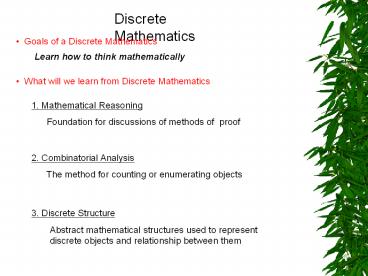Discrete%20Mathematics PowerPoint PPT Presentation
Title: Discrete%20Mathematics
1
Discrete Mathematics
- Goals of a Discrete Mathematics
Learn how to think mathematically
- What will we learn from Discrete Mathematics
1. Mathematical Reasoning Foundation
for discussions of methods of proof
2. Combinatorial Analysis The method for
counting or enumerating objects
3. Discrete Structure Abstract mathematical
structures used to represent
discrete objects and relationship between
them
2
4. Algorithms Thinking Algorithm is the
specification for solving problems. Its
design and analysis is a mathematical activity.
5. Application and Modeling Discrete Math
has applications to most area of study.
Modeling with it is an extremely important
problem-solving skill .
- How to learn Discrete Mathematics?
- Do as many exercises as you possibly can !
3
Chapter 1 The Foundations Logic, Sets, and
Functions
- Rules of logic specify the precise meaning of
- mathematics statements.
- Sets are collections of objects.
- A function sets up a special relation between
two sets.
1.1 Logic
A proposition is a statement that is either true
or false, but not both.
Examples
Propositions 1. This class has 25 students. 2.
4812 3. 537
Not propositions 1. What time is it? 2. Read
this carefully. 3. x1 2.
4
- We let propositions be represented as p,q,r,s,.
- The value of a proposition is either T(true)
or F(false).
Examples
p Toronto is the capital of Canada.
5
Examples
6
Examples
7
Examples
8
Examples
Another example If today is Friday, then 236.
9
Examples
10
Translating English Sentences into Logical
Expressions
Example 1
You can access the Internet from campus only if
you are a computer science major or you are not a
freshman.
a . You can access the Internet from campus. c.
You are a computer science major. f. You are
freshman.
Example 2
You cannot ride the roller coaster if you are
under 4 feet tall unless you are older than 16
years old.
q. You can ride the roller coaster. r. You are
under 4 feet tall. s. You are older than 16
years old.
11
- A bit has two values 1(true) and 0(false).
- A variable is called a Boolean variable if its
value is either true or
false. - Bit operations are written to be
AND, OR and XOR in programming languages.
Example Extend bit operations to bit strings.
12
1.2 Propositional Equivalences
Definition 1. A tautology is a compound
proposition that is always true no matter what
the values of the propositions that occur in it.
A contradiction is a compound proposition that is
always false.A contingency is a proposition that
is neither a tautology nor a contradiction.
Example 1.
13
- Using a truth table to determine whether two
propositions are equivalent
Example 3
Example 2
14
- Some important
- equivalences.
15
Example 4
Example 5
16
1.3 Predicates and Quantifiers
A statement involving a variable x is P(x) is
said to be a propositional function if x is a
variable and P(x) becomes a proposition when a
value has been assigned to x.
17
(No Transcript)
18
(No Transcript)
19
Solution Every student in your school has a
computer or has a friend who
has a computer.
Solution There is a student none of whose
friends are also friends with
each other.
20
(No Transcript)
21
(No Transcript)

